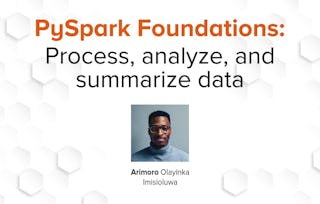Welcome to Introduction to PySpark, a short course strategically crafted to empower you with the skills needed to assess the concepts of Big Data Management and efficiently perform data analysis using PySpark. Throughout this short course, you will acquire the expertise to perform data processing with PySpark, enabling you to efficiently handle large-scale datasets, conduct advanced analytics, and derive valuable insights from diverse data sources.
即将结束: 只需 199 美元(原价 399 美元)即可通过 Coursera Plus 学习新技能。立即节省
您将学到什么
Understand PySpark fundamentals to process big data efficiently using Python APIs.
Apply real-time data processing techniques for actionable insights.
Explore Spark architecture for distributed computing and scalability.
Build hands-on skills with PySpark through practical assignments.
您将获得的技能
要了解的详细信息

添加到您的领英档案
5 项作业
了解顶级公司的员工如何掌握热门技能

该课程共有1个模块
Welcome to Introduction to PySpark. In this short course, you will learn the fundamental concepts of PySpark and Bigdata, and learn to perform real-time data processing with PySpark to gain useful insights from the data.
涵盖的内容
27个视频7篇阅读材料5个作业2个讨论话题
从 Software Development 浏览更多内容
 状态:免费试用
状态:免费试用 状态:免费试用
状态:免费试用 状态:免费试用
状态:免费试用
人们为什么选择 Coursera 来帮助自己实现职业发展




常见问题
PySpark is used on various platforms, including cloud services like Amazon Web Services (AWS), Microsoft Azure, and Google Cloud Platform (GCP), as well as on-premises clusters and local machines, providing flexibility for distributed data processing across different environments.
Yes, PySpark is an open-source distributed computing framework that is freely available. It allows users to process large-scale data sets efficiently using Python APIs on Apache Spark's distributed processing engine.
The course lasts approximately three hours and covers topics such as Big Data, Hadoop, Spark architecture, and PySpark.
更多问题
提供助学金,






